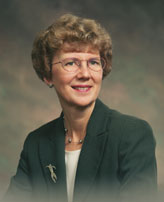

A publication of The Graduate School, University of North Carolina at Chapel Hill
Archives Spring 2001
Home | Back issues | About us | Email your feedback | The Graduate School | UNC-Chapel Hill | Make a gift

 |
Looking
back over my 28 years at Carolina, I can think of several reasons why
our graduate programs have remained among the best in the world. One of
the most important reasons is Carolina’s diversity. By recruiting
students from all walks of life and admitting the brightest among them,
we have built a culturally and intellectually diverse community, so that
our students thrive both academically and personally.
Diversity pervades the Carolina
campus. Graduate admissions records for 2000 show that about 25 percent
of our graduate students are minority or international students. And 59
percent of our graduate students are women.
In a diverse academic community,
graduate students benefit from the unique perspectives of their colleagues.
The richer the mix of students’ backgrounds in a graduate research
setting, the more thorough and comprehensive students’ research questions
will be. Between the covers of this issue of The Fountain, we hope
to show you why diversity is vital for fostering a high quality environment
for graduate education. Carolina’s interdisciplinary and global approaches
to research and education, along with a strong sense of community among
students, faculty and alumni, have made the Graduate School at UNC-Chapel
Hill one of the nation’s top research institutions.
We also feel it’s important
to design programs that encourage students to extend their skills beyond
their particular area of expertise, so they may begin learning the languages
of other disciplines and the value of teamwork. We have been able to provide
that opportunity for students, thanks to the persistent support and vision
of committed donors, who are often featured in The Fountain.
In this issue, you’ll
meet Professors Emeriti Shirley and Charles Weiss, whose legacy of academic
excellence and vision lives on in the Weiss Urban Livability Fellowship
program. The Weiss Fellowship program and others like it provide a wealth
of diversity, in terms of ethnicity, gender, age and academic interests.
We’ll introduce you to donor William Darity, who is a devoted advocate
of graduate education at Carolina and a member of the Graduate School
Advancement Board.
Both Darity and the Weisses
recall a time when the University had just begun reaching out to African
Americans and women. To put their memories into perspective, we’ve
given you a history of diversity on campus, from the first international
student admitted to Carolina in 1893, to the substantial growth in the
number of women and domestic minorities in the last century.
You’ll meet the Latané
Fellows, who have embraced one another’s intellectual and cultural
differences to work together on an interdisciplinary human and social
science research project, which they will complete this semester. We feature
a Native American graduate student, whose cultural background has permeated
her professional and academic pursuits and drives her involvement in campus
activities.
We’ll tell you about two
international students’ unique accounts of life at Carolina and their
academic pursuits, which are on the cutting edge of research in their
fields. We’ll also share The Fountain’s conversation
with a Royster Fellow whose Mexican-American background continues to influence
her life and her work.
These stories, as engaging as they may be, are just examples of the wealth of diversity on the Carolina campus. We hope you’ll enjoy these engaging accounts of academic excellence, generosity and vision, cross-cultural friendships and intellectual diversity.
-Linda Dykstra
© 2002, The Graduate School, The University of
North Carolina at Chapel Hill
All text and images are property of The Graduate School
at the University of North Carolina-Chapel Hill. Contact Sandra Hoeflich
at shoeflic@email.unc.edu
to request permission for reproduction.
Contact Alexandra Obregon at aobregon@email.unc.edu if you have technical problems with this Web site.